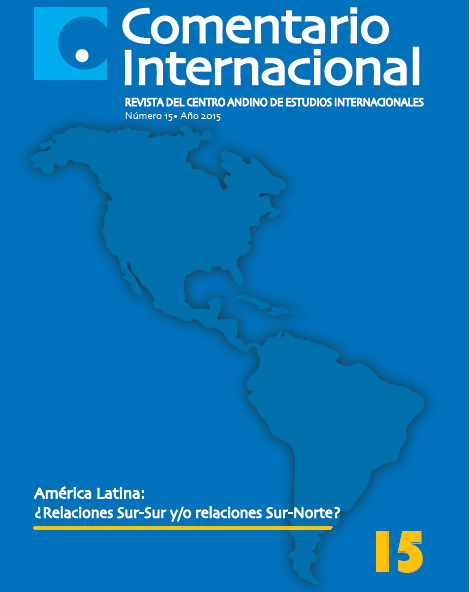América Latina ¿Relaciones Sur-Sur y/o relaciones Sur-Norte? Nuevas formas de Cooperación Sur-Sur: El rol del Ecuador en la MINUSTAH
Contenido principal del artículo
Resumen
resurgimiento de la Cooperación Sur-Sur en las agendas de los Estados del Sur Global convoca a un análisis detallado de su naturaleza, alcances y efectividad en la búsqueda por la generación de un Nuevo Orden Mundial basado en relaciones simétricas entre los Estados. Así, la composición de nuevos bloques de poder en la geopolítica global, permiten la transformación estructural del sistema internacional, promoviendo nuevos regionalismos de gran influencia, con potencias de mediano tamaño que comanden las acciones y cuyo motor sea la Cooperación Sur-Sur. Muchos desafíos se presentan en este proceso y es necesario realizar una caracterización al accionar de la Cooperación Sur-Sur, como una alternativa plausible a la Cooperación Norte-Sur. Una evaluación preliminar del rol de Ecuador en la Misión de las Naciones Unidas para la estabilización en Haití (MINUSTAH), puede permitir formas de evaluación sobre las características de una nueva forma de Cooperación Sur-Sur.
##plugins.themes.bootstrap3.displayStats.downloads##
Detalles del artículo
Sección
Los autores que publiquen en esta revista aceptan las siguientes condiciones:
1. Los autores conservan los derechos de autor y ceden a la revista Comentario Internacional el derecho de la primera publicación, con el trabajo registrado con la licencia de atribución de Creative Commons, que permite a terceros utilizar lo publicado siempre que mencionen la autoría del trabajo y a la primera publicación en esta revista.
2. Los autores pueden realizar otros acuerdos contractuales independientes y adicionales para la distribución no exclusiva de la versión del artículo publicado en esta revista (p. ej., incluirlo en un repositorio institucional o publicarlo en un libro) siempre que indiquen claramente que el trabajo se publicó por primera vez en Comentario Internacional.


